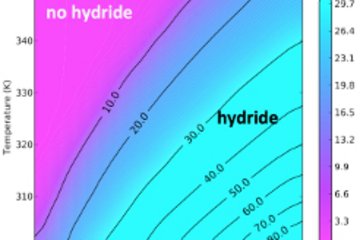All genres
21.
Talk
Adaptive C content in coherently strained kappa-carbides - An ab-initio explanation of atom probe tomography data. TMS 2015, Orlando, FL, USA (2015)
22.
Talk
Adaptive C content in coherently strained kappa-carbides - An ab initio explanation of atom probe tomography data. 2nd German-Austrian Workshop on "Computational Materials Science on Complex Energy Landscapes", Kirchdorf, Austria (2015)
23.
Talk
Ab initio insights into the interaction of hydrogen with precipitates in steels. Workshop on Hydrogen Embrittlement and Sour Gas Corrosion 2015, Düsseldorf, Germany (2015)
24.
Talk
Ab initio based understanding of the segregation and diffusion mechanisms of hydrogen in steels. SteelyHydrogen 2014, International conference on hydrogen in steels, Ghent, Belgium (2014)
25.
Talk
Impact of light elements on interface properties in steels. CECAM workshop “Modeling Metal Failure Across Multiple Scales”, Lausanne, Switzerland (2014)
26.
Talk
Ab initio based understanding of the segregation and diffusion mechanisms of hydrogen in steels. TMS Annual Meeting 2014, San Diego, CA, USA (2014)
27.
Talk
Ab-initio study of hydrogen trapping by kappa-carbides in an austenitic Fe matrix. DPG Frühjahrstagung, Dresden, Germany (2014)
28.
Talk
Hydrogen-carbide interactions in steels: Ab-initio calculations combined with experiment. Steel & Hydrogen, 2nd International Conference on Metals and Hydrogen, Gent, Belgium (2014)
29.
Talk
Ab initio based understanding of the segregation and diffusion mechanisms of hydrogen in steels. Workshop on Hydrogen Embrittlement, Düsseldorf, Germany (2014)
30.
Talk
kappa-carbides as precipitates in austenitic steels: Ab initio study of structural, magnetic and Interface properties. EUROMAT 2013, Sevilla, Spain (2013)
31.
Talk
Ab-initio based prediction of chemical trends for phase transitions in magnetic shape memory alloys. Weekly Seminar, Interdisciplinary Centre for Advanced Materials Simulation (ICAMS), Ruhr-Universität Bochum, Bochum, Germany (2013)
32.
Talk
Ab initio study of kappa-carbides as precipitates in austenitic Fe matrix. DPG Frühjahrstagung 2013, Regensburg, Germany (2013)
33.
Poster
Off-stoichiometric composition of κ carbide in Fe–Mn–Al–C steels: An ab-initio study combined with experiment. ADIS 2016 Workshop, Tegernsee, Germany (2016)
34.
Poster
Ab-initio based prediction of magnetism in Fe–Mn–Al–C kappa-carbide precipitates in steels. ADIS Workshop , Ringberg, Germany (2014)
35.
Poster
Ab-initio based study of kappa-carbides in Fe-based alloys. Asia Sweden meeting on understanding functional materials from lattice dynamics (ASMFLD) conference, Indian Institute of technology Guwahati, Guwahati, India (2014)
36.
Poster
Ab-initio understanding of interaction of kappa-carbide with hydrogen in steels. ICAMS Science Days , Bochum, Germany (2014)











